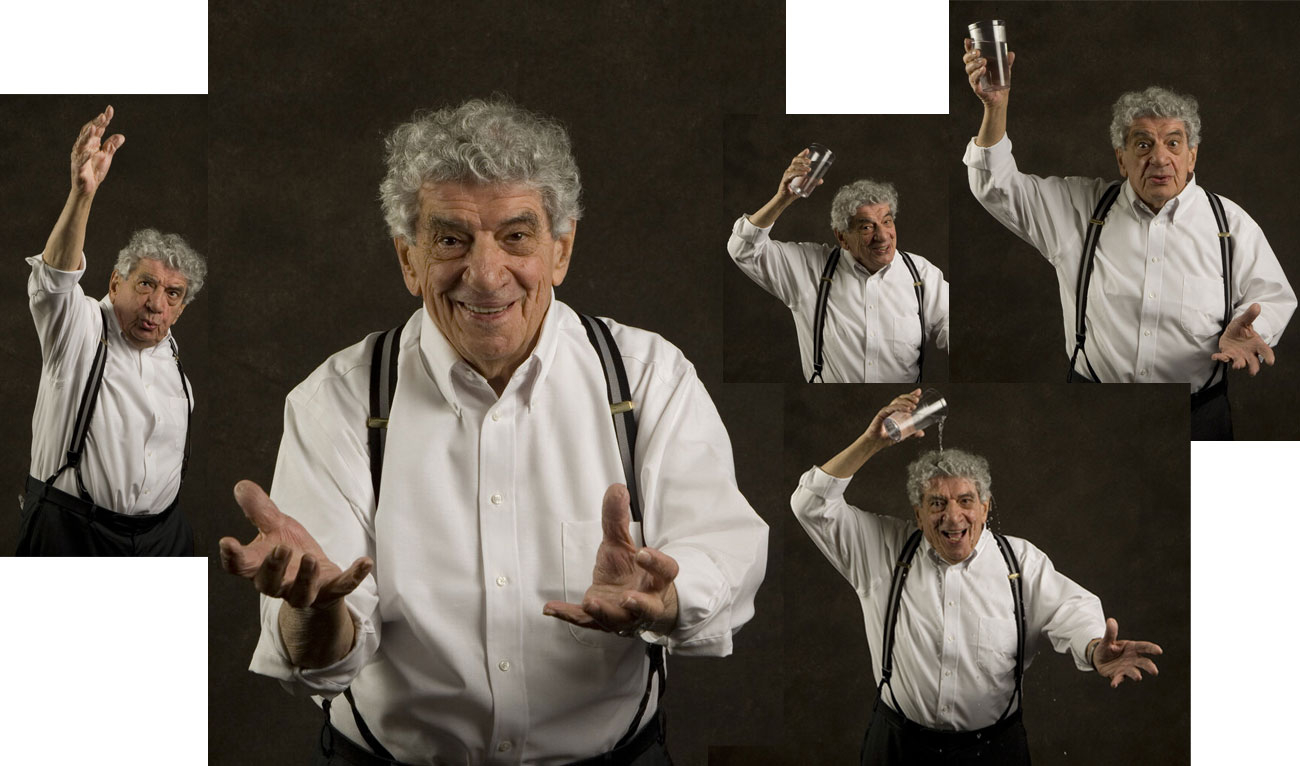Dynamo
In a 2010 TEDxDartmouth video of the late professor John Rassias giving a lecture, the aging prof gamely takes the stage with the help of a cane—then promptly tosses it aside. Watching this bit of theater and hearing the familiar sound of his voice made me smile. But as the lecture unfolded, I became saddened by the toll that time had taken on him. I searched for other videos, hoping to find one from his younger, more vital days—the Rassias of my youth.
“With sharp black eyes, and masses of dark hair always in disarray, he could be a Mediterranean brigand,” Jean Kemeny, the wife of former Dartmouth President John Kemeny, once wrote of Rassias. “His hair gleams from his sweat of exertion. [He] is indefatigable…part actor, part dynamo, all teacher.”
He is best known for invigorating the College’s language departments and changing the way we learn languages. His rapid-fire Rassias Method of teaching far outpaced traditional approaches and has been replicated around the world.
Less well-known is that Rassias also taught modern French literature. On campus, his classes were notorious. Even though he lectured entirely in French, students packed into 105 Dartmouth Hall for his courses. I took three—and French wasn’t even my major.
Rassias didn’t just lecture, he performed. I watched him die a dozen times, blood spurting from his mouth or stomach, staining his white shirts red. I saw him tear open countless shirts in anguish, raging at the gods above.
His literature classes brought works by Anouilh, Sartre, Camus, and Ionesco to life. Once a student confessed bewilderment over Ionesco’s Rhinoceros. It seemed to be a nonsensical play about a town whose residents calmly watch as their fellow citizens turn into a herd of rhinos.
Huffing and grunting, Rassias began to transform right in front of us. He doubled over, his right hand becoming a horn on top of his head. He stomped his hoof and each time it hit the ground his horn extended a little further. When the alteration was complete, the horn had become a Nazi salute. You could hear our collective sigh of understanding—the play is about complacency in the face of spreading fascism.
No one was safe in a Rassias class. He waded among the theater-style seats to engage his students and brought us on stage to explore the scenes we were studying. He believed that you couldn’t truly understand a play unless you acted in it and brought its characters to life. Instead of a final, he required every student to participate in the production of one play we had studied.
If he found attention waning, Rassias would climb the walls, scaling the molding that framed the classroom until he was sitting high above us like a modern Greek chorus. He exhorted us to write, explaining that many of the playwrights we were studying began when they were “plus jeunes que vous!”—younger than us. And he treated us as adults, refusing to shy away from the sexual implications of the plays we read.
He often brought students home to dine with his wife and family. He gave everyone nicknames, perhaps a throwback to his days as a Marine. Mine was “Fils-de-joie” which, loosely translated, means “son of glee” (Gleason). He dubbed John Bird ’77 “Oiseau.” The nicknames stuck, inside and outside his classroom. To this day, friends I met in the French program still call me “Fils.”
His last class of the term was always a spectacle. You didn’t wear anything you didn’t want ruined.
During my junior year, Robert “Copa” Cavanagh ’76 and I directed La Machine Infernale by Jean Cocteau. Rassias helped us secure Rollins Chapel for the production. During dress rehearsal we realized that light through the chapel skylights would destroy the optical illusions we had planned. We recruited two mountain-climber friends to rappel from the roof and cover the panes with cardboard. The Hanover police took exception to this until we called Rassias to our rescue. The cardboard stayed, and the play went off as planned.
His last class of the term was always a spectacle. You didn’t wear anything you didn’t want ruined. Once he performed a play about a butcher who became so frustrated with the banality of his customers that he pelted them (us) with the meat he had chopped during the play. (We, of course, threw it back.) In another, he used a clay head on a table as a foil to recreate the summation of every play we had studied. For the final scene from Camus’ Caligula, he violently stabbed the head-—and brain-like goo oozed from it.
He gripped the knife, blade in hand, and shouted, “Le théâtre est réel!”—theater is real. I saw him wince and realized he had just sliced open his palm. Rather than head to the infirmary, as a sane person would, Rassias displayed his blood-dripping hand to us, whispering, “Le théâtre est réel.”
The last time I saw him, I was visiting Hanover for a summer class about 20 years after I graduated. He was speaking to a group about his famous teaching method and I sat in just to watch the show. He dove into the audience with a devilish grin, waving his arms and holding his spectators spellbound. In mid-sentence, as he walked by my chair, he looked down and saw me. “Fils!” he exclaimed, lifting me up for a bear hug.
Just prior to his death, one of his old students made a video of him holding court during reunions. Hundreds of alumni lined up to see him, many with tears in their eyes. Rassias, cane in hand, reminisced with them all, called them by their nicknames, and gave each of them a hug goodbye. I wish I had been one of them.
Joe Gleason is a contributor who lives in Clifton, Virginia. Rassias taught at the College for 50 years and died in 2015, three months after he retired.











